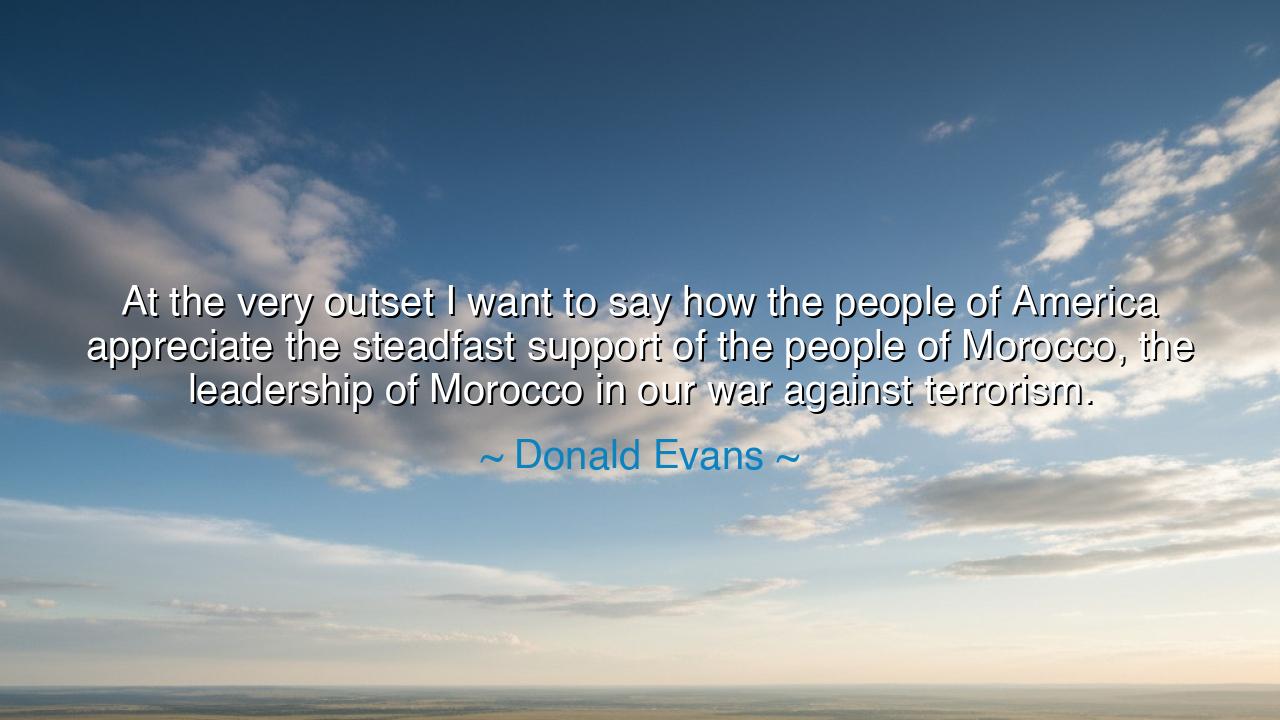
At the very outset I want to say how the people of America
At the very outset I want to say how the people of America appreciate the steadfast support of the people of Morocco, the leadership of Morocco in our war against terrorism.






In the words of Donald Evans, “At the very outset I want to say how the people of America appreciate the steadfast support of the people of Morocco, the leadership of Morocco in our war against terrorism,” there rings a note of gratitude that reaches beyond diplomacy. His words, spoken in the wake of one of humanity’s most troubled eras, remind us that solidarity between nations is not born of convenience, but of shared conviction — the belief that the defense of peace, of dignity, and of innocent life must transcend borders. In these words, Evans honors not only Morocco’s leadership, but the eternal truth that in moments of darkness, the light of unity becomes humanity’s most sacred weapon.
To understand the depth of this declaration, we must recall its time and setting. These words were spoken in the shadow of the September 11 attacks, when the world trembled before the specter of terrorism. In that hour of fear and fury, nations faced a great test: whether to retreat into isolation or to rise together in courage. Morocco, though far from the fires that burned in New York and Washington, stood firm beside America. Its leaders, guided by wisdom and faith, refused to let terror dictate the destiny of men. They joined the chorus of those who would defend the moral order — not merely with arms, but with conviction. Thus, Evans’s statement becomes more than praise; it is a testament to brotherhood forged in the crucible of suffering.
The ancients taught that the bond of allies is strongest when it is tempered by adversity. In the age of empire, Rome and Carthage once met as enemies; yet centuries later, their descendants found peace through shared destiny. Likewise, the alliance between the United States and Morocco reaches deep into history — to the eighteenth century, when Morocco became the first nation to recognize the independence of America. From that moment onward, the two peoples were joined not by geography but by mutual respect and trust. Evans’s words, then, are not a mere diplomatic courtesy, but the reaffirmation of a friendship stretching back to the birth of liberty itself.
When Evans spoke of Morocco’s “leadership in the war against terrorism,” he invoked not only the courage of soldiers, but the courage of moral clarity. For true leadership is not the noise of power, but the quiet endurance of principle. Morocco’s stand was not born of pressure, but of conviction — the understanding that the struggle against terror is not the struggle of one nation, but of all humanity. This echoes the wisdom of King Mohammed VI, who often reminded the world that faith must never be used as a veil for violence. In aligning itself with the cause of justice, Morocco proved that strength and compassion need not be at odds.
The heart of this quote lies in its gratitude — a virtue too often forgotten in the halls of power. Evans speaks as one who recognizes that no nation stands alone, and that even the mightiest must kneel in thanks to those who walk beside them in times of peril. In the ancient world, the Greeks called this philia, the noble love between comrades who share a cause greater than themselves. When nations act in this spirit, they transcend politics and touch the divine, becoming instruments of a higher order — the order of peace.
History offers many echoes of such alliances. During the Second World War, it was the cooperation of nations — great and small — that turned despair into victory. Britain stood unbroken under siege, while distant lands sent their sons to fight beside her. The unity that saved civilization was not uniformity, but shared purpose. Evans’s acknowledgment of Morocco carries this same eternal message: that the preservation of peace depends not on power alone, but on the willingness of free peoples to stand together in faith and courage.
From this, we may draw a timeless lesson: gratitude and solidarity are the pillars of human endurance. In every struggle — whether between nations or within the human heart — victory belongs not to those who fight alone, but to those who recognize their interdependence. To honor the friendship of others, to speak thanks with sincerity, is to keep alive the sacred flame of trust that holds the world together. The war against terror may be fought with weapons, but it is won with unity, compassion, and resolve.
So let us remember, as Evans did, that gratitude is not weakness, and alliance is not dependence. They are the hallmarks of wisdom — the proof that even in an age of chaos, the human spirit can choose harmony over hatred. And as long as nations and peoples continue to stand shoulder to shoulder, bound by truth and by courage, then no terror, however dark, shall ever extinguish the light of our shared humanity.






AAdministratorAdministrator
Welcome, honored guests. Please leave a comment, we will respond soon